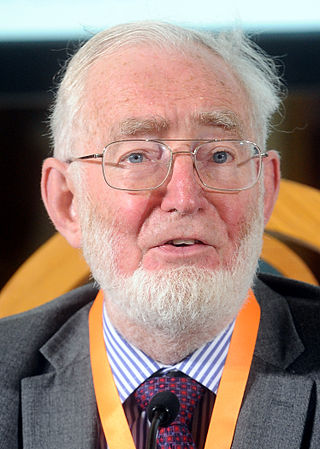Economics is a social science that studies the production, distribution, and consumption of goods and services.

The economy of South Africa is a mixed economy, emerging market, and upper-middle-income economy, one of only eight such countries in Africa. The economy is the most industrialized, technologically advanced, and diversified economy in Africa. Following 1996, at the end of over twelve years of international sanctions, South Africa's nominal gross domestic product (GDP) almost tripled to a peak of US$416 billion in 2011. In the same period, foreign exchange reserves increased from US$3 billion to nearly US$50 billion, creating a diversified economy with a growing and sizable middle class, within three decades of ending apartheid.

Economic inequality is an umbrella term for a) income inequality or distribution of income, b) wealth inequality or distribution of wealth, and c) consumption inequality. Each of these can be measured between two or more nations, within a single nation, or between and within sub-populations.

In economics, income distribution covers how a country's total GDP is distributed amongst its population. Economic theory and economic policy have long seen income and its distribution as a central concern. Unequal distribution of income causes economic inequality which is a concern in almost all countries around the world.
Feminization of poverty refers to a trend of increasing inequality in living standards between men and women due to the widening gender gap in poverty. This phenomenon largely links to how women and children are disproportionately represented within the lower socioeconomic status community in comparison to men within the same socioeconomic status. Causes of the feminization of poverty include the structure of family and household, employment, sexual violence, education, climate change, "femonomics" and health. The traditional stereotypes of women remain embedded in many cultures restricting income opportunities and community involvement for many women. Matched with a low foundation income, this can manifest to a cycle of poverty and thus an inter-generational issue.

Sir Anthony Barnes Atkinson was a British economist, Centennial Professor at the London School of Economics, and senior research fellow of Nuffield College, Oxford.

Branko Milanović is a Serbian-American economist. He is most known for his work on income distribution and inequality.
Lars Osberg has been a member of the Economics Department at Dalhousie University since 1977. He also worked for a brief period at the University of Western Ontario. He is well known internationally for his contributions in the field of economics. His major research interests are the measurement and determinants of inequality, social exclusion and poverty, measurement of economic well-being, leisure co-ordination and economic well-being, time use and economic development, economic insecurity.

Rural poverty refers to situations where people living in non-urban regions are in a state or condition of lacking the financial resources and essentials for living. It takes account of factors of rural society, rural economy, and political systems that give rise to the marginalization and economic disadvantage found there. Rural areas, because of their small, spread-out populations, typically have less well maintained infrastructure and a harder time accessing markets, which tend to be concentrated in population centers.

John Micklewright is Professor Emeritus of Economics and Social Statistics at UCL Social Research Institute, University College London.

Johannes de Villiers Graaff was a neoclassical South African welfare economist. Graaff is noted for his work on optimal savings rates, contributions to the creation of the social welfare function and for his 1957 magnum opus Theoretical Welfare Economics.
Intra-household bargaining refers to negotiations that occur between members of a household in order to arrive at decisions regarding the household unit, like whether to spend or save or whether to study or work.
Sanjiv M. Ravi Kanbur, is T.H. Lee Professor of World Affairs, International Professor of Applied Economics, and Professor of Economics at Cornell University. He worked for the World Bank for almost two decades and was the director of the World Development Report.

David H. Autor is an American economist, public policy scholar, and professor of economics at the Massachusetts Institute of Technology (MIT), where he also acts as co-director of the School Effectiveness and Inequality Initiative. Although Autor has contributed to a variety of fields in economics his research generally focuses on topics from labor economics.

Effects of income inequality, researchers have found, include higher rates of health and social problems, and lower rates of social goods, a lower population-wide satisfaction and happiness and even a lower level of economic growth when human capital is neglected for high-end consumption. For the top 21 industrialised countries, counting each person equally, life expectancy is lower in more unequal countries. A similar relationship exists among US states.
Francis Wilson was a South African economist.
The Household, Income and Labour Dynamics in Australia (HILDA) Survey is an Australian household-based panel study which began in 2001. It has been used for examining a wide variety of economic, social, health and other issues, examples of which include: the incidence of persistent poverty; assets and income in the transition to retirement; the correlates and impact of changes in physical and mental health; and an international comparison of wealth and happiness. The survey is widely used by Australian and international researchers in the fields of economics, social science, health and social policy and by the Australian Government. The HILDA survey is managed by a small team in the Melbourne Institute of Applied Economic and Social Research at the University of Melbourne. The inaugural director of the study was Professor Mark Wooden, who served in the role from 2000 to 2023. It is currently led by Nicole Watson and Roger Wilkins. The fieldwork was carried out by ACNielsen from 2001 to 2009 and has since been carried out by Roy Morgan Research. The survey is funded by the Australian Government through the Department of Social Services.

Haroon Bhorat is Professor of Economics and Director of the Development Policy Research Unit (DPRU) at the University of Cape Town. His area of research has concentrated on labour economics and poverty/income distribution mainly in his native South Africa, and recently, been expanded to other parts of Africa - in which he is world-renowned authority.
Ingrid Woolard is dean at Stellenbosch University's faculty of economic and management sciences and professor of economics at Stellenbosch University. She was a professor of economics at the University of Cape Town and a Research Associate of the Southern Africa Labour and Development Research Unit (SALDRU). Her research focuses primarily on Labour markets, social protection and assistance, poverty and inequality, tax policy, fiscal policy, unemployment, and survey methodology.
South Africa has one of the most extensive social welfare systems among developing countries in the world. In 2019, an estimated 18 million people received some form of social grant provided by the government.










